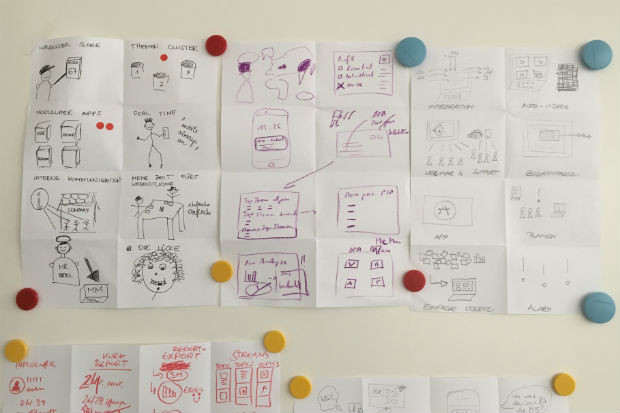Austria Press Agency (APA) has 150 employees in the field of technology to fulfil its mission of providing "services which would be too expensive for each of the media companies" to build and sustain on their own.
Clemens Pig, chief executive of APA, spoke about the agency’s strategy on a panel about digital transformation at the GEN Summit in Vienna on 21 June.
"As a news agency, we work as a platform in general to share technology," he told delegates in his talk. "Throughout the decades we described which services are now necessary," he added, pointing to the introduction of livestreaming, liveblogging and new infrastructure.
Journalism.co.uk visited APA to find out more about the APA-medialab, a recent addition to the newsroom. Since January 2017, APA-medialab has been hosting monthly 'sprints' to take an idea to prototype in just one week, attempting to solve problems that affect the media industry.
The lab is tackling topics including fake news, automation, virtual and augmented reality, and voice-controlled interfaces – it currently has its sights set on finding better ways to work with election data ahead of the Austrian legislative elections in 2017.
"There are so many units at APA, so many people, so many ideas, but we need a place for it, and this is when [Clemens Pig] thought about the APA-medialab,” Katharina Schell, member of the editorial board of APA and a member of the APA-medialab, told Journalism.co.uk.
"We are very interdisciplinary, we have developers – front-end, back-end, full stack, user experience – we have research, we have marketing and communications, and then editorial input."
The APA-medialab inhabits a room that used to be a library, a smoking room, and office, and then a smoking room again, but is now refurbished with sliding doors and different furniture from all other meeting rooms in the building.
This creative space is located "in the middle of the newsroom, in the heart of the news agency," said Schell, and is tasked primarily with innovation research and prototyping.
The monthly sprints run from Monday to Friday, and include the regular APA-medialab staff, newsroom specialists with expertise in the topic of the sprint, and the clients, who are involved at the early stages of the process to ensure the final prototype suits their needs and workflows.
On Monday during a sprint, the team starts with a problem, and the goal is to have finished a prototype by Friday.
"In the early stages of every project we talk to clients and we ask them how they work and why, their needs, attitudes and things they don’t like about our existing products," explained Schell.
"Then we start scribbling down some of the solutions. We decide which one is going to be tried out and then we build the prototype.
"In an ideal week, on Friday we can get back to the clients and let them test it, so in one week we have the problem and the magic moment of swiping something or clicking an interface which works."
New ideas can be introduced at "lightning speed right now", said Schell, who used to be the head of the politics department at APA for almost nine years before her current role. Back then, an idea would go to a product manager, who would send it to developers if it had potential, and they would get back about costs, which were generally considered too high – "and the idea was dead because we never did any prototyping".
One prototype that came out of such a sprint is SourceCheck, APA’s take on fighting misinformation online. Rather than labelling stories and claims as true or false, SourceCheck provides information about the key sources of media in Austria, helping news outlets along the way in the verification process.
“It’s a database of online sources in Austria without saying good or bad or evil, because that's not our job. Our job is to provide information to help categorise and understand them.”
You can see other prototypes on the APA-medialab website.
Note: The session Clemens Pig took part in at the GEN Summit was moderated by Catalina Albeanu, international editor, Journalism.co.uk.
Free daily newsletter
If you like our news and feature articles, you can sign up to receive our free daily (Mon-Fri) email newsletter (mobile friendly).
Related articles
- Why PressPad closed down, with Olivia Crellin
- How do journalists really want to use generative AI?
- How a Greenlandic publisher uses its own AI translator to boost subscriptions
- What AI can do for your newsroom: tips from Ring Publishing's latest handbook
- Creating and developing GenAI workflows in the newsroom, with David Caswell










